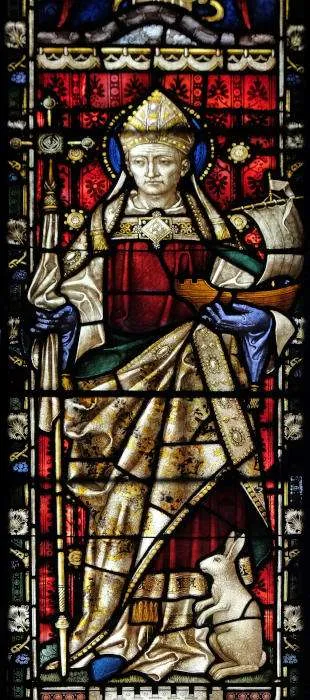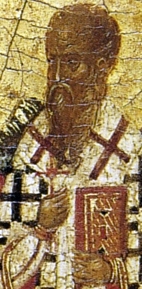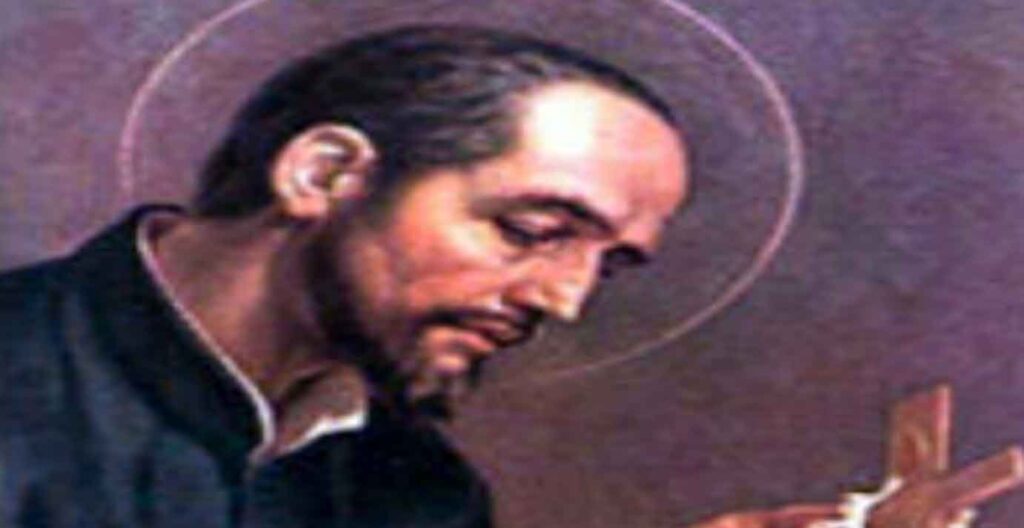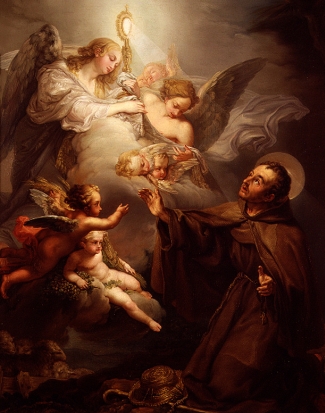c. 1033–1109; Especially invoked by scholastic philosophers and in Canterbury; Possibly canonized prior to 1170; canonization confirmed by Pope Alexander VI on October 4, 1494; Declared a Doctor of the Church by Pope Clement XI in 1720
He was an Italian, Frenchman, and Englishman; a monk, prior, abbot, archbishop, philosopher, theologian, and spiritual writer; today he is a saint, a Doctor of the Church, and commonly referred to as the “Father of Scholasticism.” Anselm was born into a noble family in the town of Aosta, located in the Italian Alps. As a youth, his devout mother set a pious example which he readily followed. When Anselm was fifteen, he wanted to enter the monastic life, but his father would not give consent. So the abbot refused his entrance. His mother had since passed, so she could not intervene. Disillusioned, Anselm’s faith wavered for the next several years. Coming to his senses, he pursued studies in France and eventually arrived at the Benedictine Abbey of Bec around the age of twenty-six. Anselm quickly became close to and a devoted student of the prior, Lanfranc. When Anselm’s father died, Anselm was in a quandary about what to do. Should he return home to receive the inheritance of his father’s estate and put it to good use? Or should he abandon it and become a monk? Lanfranc directed him to a holy bishop for spiritual advice, and Anselm decided on religious life. He returned to the Abbey of Bec and became a monk at the age of twenty-seven.
After Anselm enjoyed three blessed years of monastic life, Lanfranc, the prior, was appointed abbot of another abbey. Anselm was chosen as the prior of Bec at the age of thirty under the elderly founding abbot, Herluin. Though some of the monks disapproved of this appointment due to Anselm’s youth, his wisdom, personality, heartfelt kindness, and holiness soon won them over. He remained the prior for the next fifteen years.
As prior, Anselm studied, prayed, taught, and administered the abbey remarkably well. He was such a success that the Abbey of Bec became one of the most respected institutions in all of Europe. At Bec, Anselm wrote seven of his thirteen works, including two of his most famous ones: Monologion and Proslogion. Anselm had a profound faith, fueled by a life of intense mystical prayer, and it was his prayer and faith that directed his thinking and writing. He believed that unless God first revealed Himself, our minds could never grasp Him, could never grasp Truth.
One of Anselm’s greatest philosophical contributions is his ontological argument for the existence of God. In his first great work, Monologion, Anselm argued that we can arrive at the existence of God using deductive reasoning. For example, if we consider the idea of “good,” we are aware of varying degrees of goodness. Therefore, there must be that which is supreme goodness itself. This supreme good must also be responsible for all else that is good. God is that Goodness. He does not simply have goodness, He is Goodness. In his great work, Proslogion, Anselm began with the concept of a being than which no greater can be conceived. From that concept, he goes through logical deductions that lead him to conclude that a being than which no greater can be conceived necessarily exists. This argument has been one of the most discussed and contested arguments in philosophy.
Philosophy was not Anselm’s only love. He was also a profound spiritual writer, theologian, and composer of many beautiful prayers. His spiritual writings are not only theoretical, they are also personal and intimate. His deep love for God and for our Blessed Mother shines through.
In 1078, Abbot Herluin died and Anselm was elected his successor by the unanimous consent of the monks, a role he would valiantly fulfill for the next fifteen years. As abbot, Anselm periodically traveled on various properties that had been donated to the abbey across the English Channel. His counsel was also regularly sought out by the English king and his good friend Lanfranc, who had since been made the Archbishop of Canterbury. Anselm’s visits to Canterbury, coupled with the domineering intellectual influence of the Abbey of Bec, made him the ideal successor to Archbishop Lanfranc of Canterbury. When Lanfranc died, Anselm became the next Archbishop of Canterbury at the age of sixty.
Anselm’s consecration as archbishop was at first delayed because of conflicts with King William II regarding the confiscation of church property and the king’s perceived right to appoint bishops independently of the pope. King William eventually became quite ill, and, for fear of hell, he repented, and Anselm was installed. Once installed as Archbishop of Canterbury, Anselm came into conflict with King William once again and was exiled from his see. After the death of King William, the new king, King Henry, welcomed Anselm back, but Anselm soon found himself engaged in yet another dispute about the appointment of new bishops. He was once again exiled. Even in exile, God used Archbishop Anselm in powerful ways. He continued writing beautiful and profound theology, defended the nature of the Trinity at a Church council in Rome, and acted as a counselor to the pope. His times in exile also gave a lasting witness to the truths for which he was exiled. That witness not only had an impact on those in his time but also for the generations to follow. Anselm’s final years were more peaceful after he and the king worked out a compromise, and he returned to his see in Canterbury.
Saint Anselm is considered a “confessor” because he suffered for his defense of the Church and the Gospel. He fiercely defended the autonomous spiritual authority of the Church and refused to participate in financial abuses between the state and church. In addition to being a confessor, Saint Anselm’s writings continue to have a profound impact upon the Church. He stands out as one of the greatest theologians between Saint Augustine and Saint Thomas Aquinas. His prayers inflame hearts with deep devotion. His love for our Blessed Mother is inspiring. His theological explanation of the Trinity, grace, truth, and the Incarnation have provided a firm foundation for a deeper understanding of our faith. Above all, we can ponder Saint Anselm’s deep conviction that when faith in God comes first, understanding follows. If you struggle in life in any way, follow this saint’s example by placing your trust in God first, and then wait upon Him to lead you.
Source: https://mycatholic.life/saints/saints-of-the-liturgical-year/april-21-st-anselm-archbishop/








